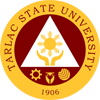Speech: President Aquino is conferred a doctorate in humanities from the Tarlac State University
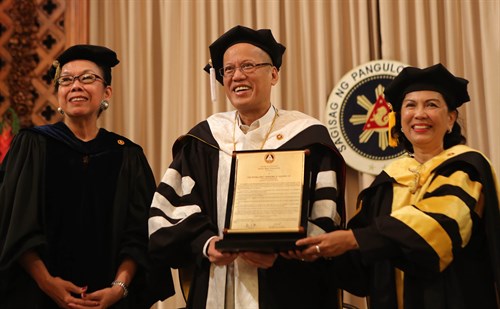 President Benigno S. Aquino III is conferred a doctorate in humanities, Honoris Causa, by Tarlac State University (TSU) president Dr. Myrna Mallari and Commission on Higher Education (CHED) chairperson Patricia Licuanan during the Conferment Ceremony at the Reception Hall of the Malacañan Palace on Thursday (May 14, 2015). (Photo by the Malacañang Photo Bureau)
President Benigno S. Aquino III is conferred a doctorate in humanities, Honoris Causa, by Tarlac State University (TSU) president Dr. Myrna Mallari and Commission on Higher Education (CHED) chairperson Patricia Licuanan during the Conferment Ceremony at the Reception Hall of the Malacañan Palace on Thursday (May 14, 2015). (Photo by the Malacañang Photo Bureau)
Speech of His Excellency Benigno S. Aquino III President of the Philippines at the conferment of a doctorate in humanities from the Tarlac State University
[Delivered in Malacanan Palace, Manila, on May 14, 2015]
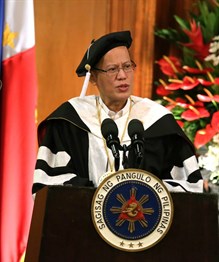 Normally ho, Tagalog ang talumpati natin. Inisip ko sana Kapampangan, kaya desisyonan po ng ating mga writer gawing English. [Laughter] Democracy ho to, kaya kung minsan sila na susunod.
Normally ho, Tagalog ang talumpati natin. Inisip ko sana Kapampangan, kaya desisyonan po ng ating mga writer gawing English. [Laughter] Democracy ho to, kaya kung minsan sila na susunod.
I am indeed grateful to Tarlac State University for conferring on me this honorary degree in humanities, which is an incredibly meaningful gesture. After all, I am a son of Tarlac, and it warms my heart knowing that none other than my fellow Tarlaqueños recognize what the entire nation has achieved these past four years and eleven months.
Let me begin by sharing a situation I encountered early on in my term that I believe shows the importance of education. I am not sure how many of you are aware of this, but until our administration came along, none of the universities in our country offered a bachelor’s degree in Meteorology. Naturally, I found this quite strange—especially for the Philippines, which is beset by so much weather phenomena on a yearly basis. Fortunately, the situation has since changed. We now have four state universities that offer a bachelor’s degree in Meteorology, and I am told that the first batch of 16 students is graduating this year, 15 of whom are joining PAGASA. Rest assured we will do everything we can to ensure the sustainablity of these programs in the long term so we can truly say that our hope is justified in PAGASA.
I can never forget what my father told me: education, once possessed, is yours for life. Knowledge will always enable us to build better lives for ourselves and our families; more importantly, it allows us to render service to our fellowmen.
I was fortunate to have parents who knew the value of education, and to have attended an institution that did not simply give us the facts to decide, but insisted on cultivating in us the ability to think for ourselves, combined with a healthy curiosity about the world. Perhaps for this reason, I have made a habit of asking questions, most of which begin with the word “why.”
For instance, why are so many Filipinos leaving the country? Why do they have to leave a country so blessed with natural resources, with such a talented, hardworking, and capable people? On an even broader scale: Why do we have to accept things as they are, when we have the ability to change them? It is my belief that the day one stops asking why is the day one stops growing, and begins stagnating.
This litany of questions is what has driven the progress that the Philippines has made these past few years. They characterized our refusal to be defeated by the broken status quo we found when we came into office, and they characterize our continuing refusal to become satisfied with all the achievements we have made.
For instance, one question that has been asked by many, not only in government: Why can’t the Filipino people break free from the shackles of poverty? In the past, most subscribed to the idea of the trickle-down effect: to focus on growing the economy and simply hope that the benefits eventually make their way to the citizenry. My administration has abandoned this way of thinking. Our answer to this question lies in the idea of empowerment. We have relentlessly pursued every manner in which we can capacitate our people, so that they can take part and contribute to growth.
One example of this can be seen in the Conditional Cash Transfer Program. When we took office, the CCT covered around 800,000 beneficiary households and was largely considered to be a dole-out program. Today, it covers more than 4.4 million households. Under our watch, the deal is simple: We provide monthly cash grants to less fortunate households, with one of the primary conditions being that children attend school regularly. The CCT has recently been expanded to cover beneficiaries with high-school aged children, and the rationale for this is based on a study that discovered that high school graduates earn around 46 percent more than those who finished some years in grade school.
This agenda of empowerment also includes government’s own efforts to improve the quality of education that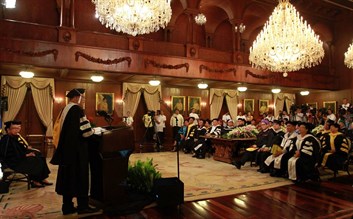 Filipinos have access to. The Technical Education and Skills Development Authority (TESDA) has forged partnerships with the private sector to improve the way we train scholars for future employment. A partnership with the Semiconductor and Electronics Industries in the Philippines, Inc. (SEIPI) yielded an 91.26 percent employment rate, just to give you one example. Take a look, also, at our admonition to state universities and colleges (SUCs) to be more relevant to their communities. This is part of our effort to avoid, if not completely eliminate, the phenomenon of students enrolling in courses that may have been popular when they entered, but are no longer relevant by the time they graduate. We are instead guiding them towards courses that will redound to real job opportunities, which is all the more significant, as more investors enter the country.
Filipinos have access to. The Technical Education and Skills Development Authority (TESDA) has forged partnerships with the private sector to improve the way we train scholars for future employment. A partnership with the Semiconductor and Electronics Industries in the Philippines, Inc. (SEIPI) yielded an 91.26 percent employment rate, just to give you one example. Take a look, also, at our admonition to state universities and colleges (SUCs) to be more relevant to their communities. This is part of our effort to avoid, if not completely eliminate, the phenomenon of students enrolling in courses that may have been popular when they entered, but are no longer relevant by the time they graduate. We are instead guiding them towards courses that will redound to real job opportunities, which is all the more significant, as more investors enter the country.
Even better news is the fact that we are not alone in asking, “Why?” One person I am reminded of is Dr. Justino Arboleda, from Bicol State University. He noticed something amiss with the status quo, and he questioned it. His question was: “Why is this institution fostering so many studies devoted to rice and corn, when the primary product and income-generating activity of Bicol is coconut?” That question started it all. He embarked on research in coconuts, and discovered even more uses for it—for instance, the use of coco coir, which is extracted from coconut husk, in preventing erosion. This is now being used by our own Department of Public Works and Highways for slope protection and soil erosion control. May I add that it is also turning out to be a major export item.
Dr. Arboleda’s question continues to yield benefits for the country. His Coco Technologies Corporation is now working with Bicol University to establish a model processing plant that will undertake the research, training, and further development of non-oil coconut products and byproducts: copra, coconets, cocopeat, coco charcoal, and cocowater, just to name a few. The good news is that this will benefit the local community and the farmers who will supply the facility with coconuts. On top of this, the projection is that, within just four years and nine months, the income from the sale of products will be enough to cover the original investment of 38.8 million pesos—and perhaps even contribute to the replication of this facility for other parts of the country. The ultimate goal being that the farmers will in turn own these factories and have the means to increase their incomes several fold.
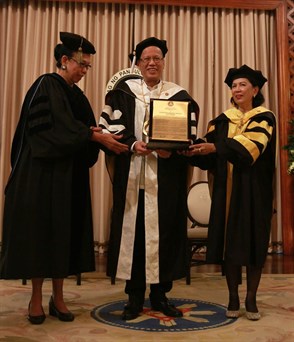 The power of asking why can also be witnessed in the rise of what has become one of our nation’s booming sectors: the IT-BPM sector. Back when he was the Secretary of Trade and Industry, Mar Roxas wondered why our nation, with its talented and English-speaking work force, couldn’t compete in the IT-BPM industry. For this reason, he worked with industry leaders and launched a program called Make IT Philippines, inviting companies from all around the world to invest in the Philippines and in the Filipino people. The fruits of his efforts are clear as day. From an industry with just a few thousand workers in the year 2000, the IT-BPM sector is now directly responsible for over a million jobs. This does not include the three to five more indirect jobs created for each direct employee. On top of this, the DTI projects that by 2016, the industry will be employing more than 1.3 million employees–direct employees–and making revenues of around $25 billion.
The power of asking why can also be witnessed in the rise of what has become one of our nation’s booming sectors: the IT-BPM sector. Back when he was the Secretary of Trade and Industry, Mar Roxas wondered why our nation, with its talented and English-speaking work force, couldn’t compete in the IT-BPM industry. For this reason, he worked with industry leaders and launched a program called Make IT Philippines, inviting companies from all around the world to invest in the Philippines and in the Filipino people. The fruits of his efforts are clear as day. From an industry with just a few thousand workers in the year 2000, the IT-BPM sector is now directly responsible for over a million jobs. This does not include the three to five more indirect jobs created for each direct employee. On top of this, the DTI projects that by 2016, the industry will be employing more than 1.3 million employees–direct employees–and making revenues of around $25 billion.
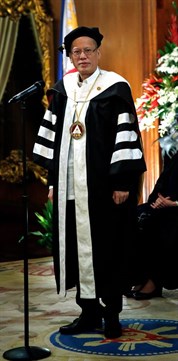 Of course, I must emphasize that the effects of this industry’s success expands far beyond the National Capital Region. As long as schools can supply the necessary talent, companies will have no qualms about setting up shop in the countryside. This will help so many other industries. It will necessitate more housing, which helps our construction sector; it means more people will be taking public transport, and buying merchandise from various merchandisers in their localities. Ultimately, it accelerates development in our rural areas, which increases the capacity of families to send their children to colleges, subsequently deepening the talent pool that can attract even more businesses to set up shop. This leads to a virtuous cycle where growth leads to more growth, where the benefits of progress do not simply trickle down, but are immediately felt by all.
Of course, I must emphasize that the effects of this industry’s success expands far beyond the National Capital Region. As long as schools can supply the necessary talent, companies will have no qualms about setting up shop in the countryside. This will help so many other industries. It will necessitate more housing, which helps our construction sector; it means more people will be taking public transport, and buying merchandise from various merchandisers in their localities. Ultimately, it accelerates development in our rural areas, which increases the capacity of families to send their children to colleges, subsequently deepening the talent pool that can attract even more businesses to set up shop. This leads to a virtuous cycle where growth leads to more growth, where the benefits of progress do not simply trickle down, but are immediately felt by all.
The results of all our efforts are becoming increasingly clear. Unemployment has gone down to just six percent—the lowest it has been in a decade. Furthermore, the Social Weather Stations Survey has reported that the proportion of families experiencing involuntary hunger has gone down to 13.5 percent in March 2015. Again, this is the lowest recorded rate in ten years, and it is equivalent to 800,000 families no longer experiencing hunger. All of this, we achieved, because we dared to ask why.
At this point, I cannot help but recall an exchange I had with my father when we were in exile in Boston. And I asked: “Why are we the ones in exile if we are in the right? Why is it so difficult to fight for what is right?” His answer was: “How can those who cannot even eat think of concepts such as freedom and dignity?” He said: “The first freedom that has to be won is the freedom from hunger. Otherwise, all other freedoms are meaningless.”
This was one of the earliest instances where I saw the value of asking “why.” My father’s answer, and that also of my mother’s guidance, has guided all the decisions I have made as a public servant, and the results are clear. I am hopeful that, having seen our resurgence these past four years and eleven months, our countrymen will protect the progress we have made; that before I step down from office, they will have cast their votes for a successor who will build upon our achievements.
Nevertheless, until the very last day of my term, I will continue working with my countrymen—who are my strength—towards building a greater Philippine nation; I will continue to ask why; I will continue to show that, indeed, the Filipino is worth fighting for.
Thank you, good day.
Credit to owner.
Photo by the Malacañang Photo Bureau
Video Courtesy of RTVMalacanang.
